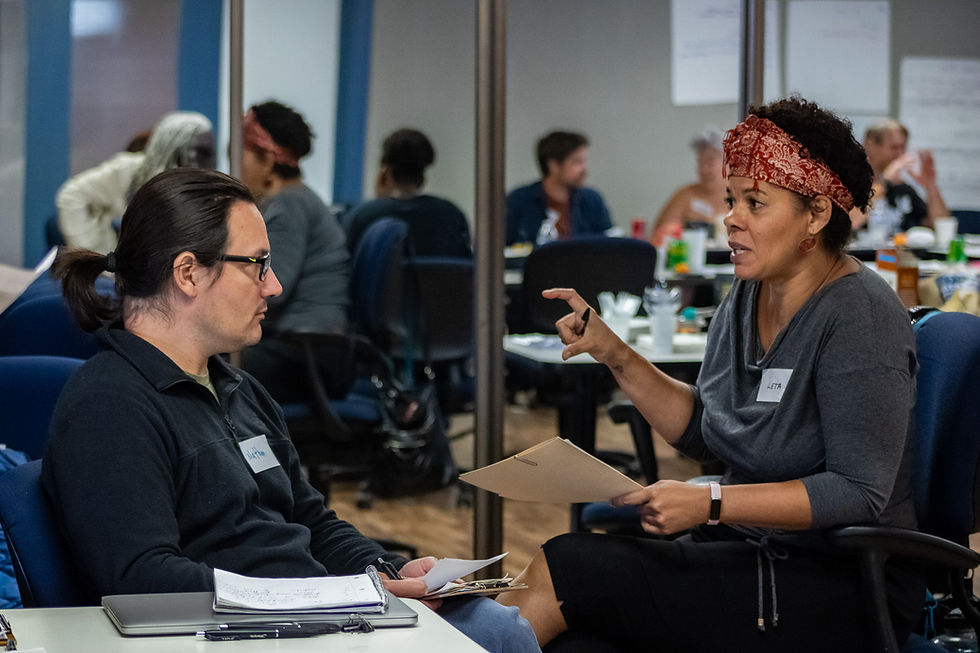An Insight Into the Social Change Marketplace for Artists with Liz Sunde from Music to Life
- Music Cities Events

- Aug 24, 2023
- 5 min read

"Our years of research and work with hundreds of artists revealed that many of these musicians wanted to take their work off the stage and into communities but didn’t know how." Liz Sunde
For this article we had the pleasure of speaking with Liz Sunde, Co-Founder of Music to Life, an organisation that collaborates with artists, nonprofit organizations, businesses, and music industry leaders to explore how music can deliver positive, measurable social change.
In the interview below you will learn about Liz' career path, learn about the work she does through Music to Life and discover some insights on how artists can make the most out of the social change marketplace, including a list of documentaries that will help you get a deeper understanding of this important topic.
Do you want to keep up to date with everything related to Music Cities Events and Music Cities topics? Then we invite you to join our Music Cities Community and to subscribe to our monthly newsletter.
Let's start by discussing your professional journey. How did you reach this point in your career?
As the daughter of Noel “Paul” Stookey (of the 1960’s folk trio Peter, Paul & Mary), I spent my childhood surrounded by music and musicians who were dedicated to using their talent in service to contemporary causes. Early on, I witnessed the profound capacity of that music to transform audiences. This fueled me to pursue work in the social change field. For more than twenty-five years, I’ve consulted with a variety of large and small nonprofit organizations, helping them conceive and implement creative solutions to their communications, organizational, and fundraising challenges. This extensive and varied experience culminated in an acute understanding of the nonprofit sector, a passion for the intersection of music and social justice, and a wide network of creatives and business experts to engage in the creation of Music to Life as we are today.
What is Music To Life and where did the idea of starting the project came from?
For about 15 years, Dad and I explored the social justice and arts field, with a diverse team of artists, industry leaders and volunteers, trying to hone in on how we could best be of service to the contemporary social change musician. Our years of research and work with hundreds of artists revealed that many of these musicians wanted to take their work off the stage and into communities but didn’t know how. In 2018, we became an official non-profit and developed the Musician Changemaker Accelerator (MCA) to address the persistent needs expressed by activist artists. The MCA trains artists as entrepreneurial leaders through sessions in concept development, partnership cultivation, grant proposal-writing, sustainable program design and more. In addition to training, we also provide performance platforms, mentoring, and paid engagement opportunities- a coordinated ecosystem of services centered around empowering artists with the resources they need to forge careers in which they’re equitably paid to implement their music-driven visions for change. With 350+ artists in our network, we’re creating a movement of musicians across genres, generations and geographies, who are harnessing the power of music to transform communities facing persistent racial, economic, civil or environmental injustice.
Which would you say are the main tendencies for artists working in the social change marketplace? Which one excites you the most? Which one is having a greater impact in the life of musicians or people that they work with?
Artists tend to think that accessing the social change marketplace involves writing an issue-driven song that touches people’s hearts. While it’s certainly possible for artists to engage their communities through the emotional power of a song or to generate donations from a single charity performance, Music to Life is interested in music’s sustained impact. Music to Life, therefore, helps artists go one step further: artists in our network are using their music as a tool in their communities, creating music-driven programs that assist vulnerable populations. For example, we work with artists who develop healing songwriting circles for the families of people suffering from substance mis-use, safe music infused spaces that encourage creative expression for at-risk youth, language learning programs for new immigrants through song. Connecting with Music to Life’s mentors, training and other resources, musicians learn to deliver more than just a benefit concert, they can convert the power of music into direct action in their communities and improve people’s lives - socio-economically, emotionally and physically.
These artists face significant challenges, of course. It’s hard enough to survive as an independent musician, let alone a musician branding themselves around socially conscious actions or issues. Adding on the time and effort it takes to work directly with community members and organizations to build music-driven programs of meaning, and there’s real sacrifice: These artists pass up paying gigs to pursue social change work, and most can’t afford to make that choice, particularly those who might be experiencing financial hardships or systemic injustices themselves. Music to Life’ is shifting the creative economy toward valuing musicians (with their diverse, lived experiences) as strategic assets for communities-in-need - equipping musicians with the tools to communicate their worth, work with grassroots leaders to build meaningful programs, and galvanize local support around the issues of our time.
Tell us a bit about these documentaries that you're sharing with us.
This overview of Music to Life's Musician Changemaker Accelerator breaks down our strategy of equipping grassroots musicians with entrepreneurial social change tools to empower local-to-global action. This innovative way of activating musicians as changemakers is the crux of our programming, encouraging communities to recognize artists as creative leaders and collaborators.
This short video from Americans for the Arts, (a national organization whose initiative - Animating Democracy - positively assessed our Musician Changemaker Accelerator) establishes how the arts make communities stronger through rejuvenating the creative economy and building empathy. It serves as an introduction to The Arts & Social Impact Explorer, an interactive tool that details the many ways that the arts improve communities.
This TedX talk from Grammy-nominated singer-songwriter (and Music to Life friend) Aloe Blacc follows the thread of message music from Woody Guthrie to today. Aloe Blacc is a co-writer on Avicii’s “Wake Me Up” and was instrumental in the creation of the acoustic music video raising awareness for immigration.
This video features the work of musician changemaker and Music to Life Juried Artist, Leta Neustaedter, as she facilitated a music-driven, anti-racism conversation with Boise High School through a collaboration with their student orchestra.
A message from Music to Life to the readers:
If you’re an artist interested in taking your music into your community to create social change, email Music to Life at artists@musictolife.org, or visit their website for ways to get involved (including a day-long Musician Changemaker Accelerator Workshop coming to Huntsville soon.)
If you’re a Huntsville-based organization (nonprofit or for profit), Music to Life is seeking partners interested in activating and supporting the work of innovative musician changemakers in the Huntsville community. Please get in touch with Executive Director, Liz Stookey Sunde, directly at lizs@musictolife.org.
If you’d just like to learn more about Music to Life, you’re encouraged to join the mailing list for inspiring events and stories featuring musician changemakers across genres, generations and geographies.






Comments